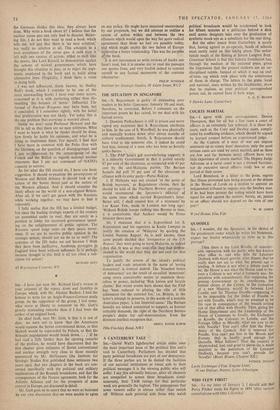A CANTERBURY TALE SIR,—David Watt's lighthearted article slides over the
most important issue of the political film unit's visit to Canterbury. Parliament has decided that party political broadcasts are part of our democracy. If the three parties are to be denied the facilities of our national institutions as visual aids to their political messages it is the viewing public who will suffer. I say this advisedly because, since all channels are compelled to screen these broadcasts simul- taneously, their TAM ratings for that particular week are generally the highest. This presupposes that some viewers suffer in silence rather than switch off. Without such pictorial aids those who watch political broadcasts would be condemned to look for fifteen minutes at a politician behind a desk until scenic designers take over the production of synthetic mock-ups as a substitute for the real thing.
But the other lesson from Canterbury is surely that, having agreed to co-operate, heads of schools must surely insist on this taking place. The unfor tunate result of the filming at'Simon Langton Boy( Grammar School is that this historic foundation has, through the medium of the national press, given the impression that the present students are an un- disciplined rabble. Instead of which it was an end- okerm rag which took place with the connivance of those in charge. The letters to the press, local and national, since written by the headmaster, show that he realises, as your political correspondent points out, he cannot have it both ways.


































 Previous page
Previous page